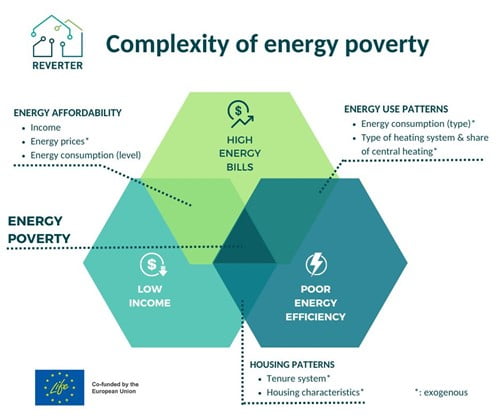Life REVERTER
Renovation roadmaps to decrease
households vulnerability to energy poverty

- Start: 01/11/2022
- End: 31/10/2025
- Total budget: 1.744.397,46 €
- Grant: 1.657.177,59 €
The REVERTER project, funded by the European Union’s LIFE programme, aims to improve the quality of life in Europe by increasing the energy efficiency of buildings.
Energy poverty in Europe:
an invisible problem
According to the latest Eurostat report and other data on energy poverty in Europe, approximately 7% of European citizens could not afford to heat their homes adequately. Additionally, 6.4% reported delays in receiving utility bills, while more than 16% spent a significantly high proportion of their income on energy costs. Another 14.6% had abnormally low energy expenditure due to their low income. Energy poverty is mainly linked to high energy prices, low household income, and energetically inefficient buildings and appliances. The energy crisis in Europe has further exacerbated the impact of these factors, with Eurostat data showing sharp price rises in the first half of 2022.
Improving energy efficiency:
“one-stop shops”
Launched last November, the project aims to provide solutions to reduce energy poverty in Europe by developing 9 roadmaps to address poor energetic efficiency in housing and working closely with end-users in 4 pilot countries. The launch meeting in Athens underlined the value of the project and its results at a time when energy poverty is becoming critical, and the need to address this growing socio-economic crisis is crucial.
The roadmaps will be tailored, taking into consideration the characteristics of the building stock, vulnerable households, and the climatic conditions of pilot countries, to cover a coherent set of cases that allow for large-scale replication of the proposed actions. The roadmaps will target the worst-performing dwellings first, address the dilemma of split incentives, and tackle market, information, and behavioural failures through the creation of one-stop shops (OSS). These roadmaps will enable the enrolment of vulnerable households in subsidised building energy efficiency improvement programs.
The project will test the roadmaps by establishing a network of pilots in four European cities (Brezovo – Bulgaria, Athens – Greece, Riga – Latvia, and Coimbra – Portugal), covering different climatic regions and socio-economic conditions.

Twelve partners and five countries
The REVERTER project is brought forward by a consortium of 12 partners and 5 countries (Greece, Portugal, Bulgaria, Latvia and Spain): Lab of Mining and Environmental Technology, Institute for Systems and Robotics (ISR-Lisbon), Ekodoma Ltd, Green Synergy Cluster, Europace Foundation, Centro for Renewable Energy Sources and Saving (CRES), B.Link Barcelona Strategic Projects, Obshtina Brezovo, EKPIZO, Câmara Municipal de Coimbra, Riga Energy Agency and WIT Berry.
